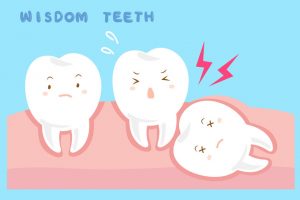
Wisdom teeth are vestigial molars that do not play any role in chewing and grinding our food. Being essentially unused and located in a place that is difficult to reach for cleaning, wisdom teeth can cause many problems, from incorrect eruption and pushing the entire row of teeth in the wrong direction to premature decay, pain and discomfort. Most people need to get their wisdom teeth removed sooner or later – here are the most common causes in more detail.
Incorrect Growth
Wisdom teeth tend to grow in, rather than properly erupting through the gum. While this can happen to other teeth as well, in their case, treatment and correction is easy, through dental aligners, braces as well as other methods – technics that cannot be used in the case of wisdom teeth. One of the most frequently encountered growth-related problems in the case of wisdom teeth is growth in the wrong direction – wisdom teeth tend to grow not vertically, but in a diagonal direction or, in very severe cases, underneath the surface of the gum, horizontally, pushing the entire row of teeth and causing the teeth to become crowded. When this happens, the dentist will first of all evaluate the situation, then they will make the decision whether to have one, two or all the wisdom teeth removed. Most wisdom tooth removal Skokie dentists do not perform such interventions, so the patient is likely to be referred to an oral surgeon for the procedure.
Decay and Infection
Wisdom teeth are very difficult to clean properly, especially the ones that have not erupted or grown correctly, therefore they are more likely to develop decay and infections than other teeth. Cavities are the most common issues that affect wisdom teeth, but untreated cavities can quickly turn into infections that affect the deeper layers of the tooth, reaching all the way to the tip of the root. While the cavities that affect wisdom teeth can be filled the same way as other teeth, more severe infections are best solved through extraction.
Sinus Problems
The wisdom teeth that grow in on the upper jaw can cause not only problems that affect the oral cavity – the incorrect growth direction can cause the tooth to rub against the sphenoid sinuses (the system of cavities behind the nose), causing discomfort, pain, even inflammations. If a wisdom tooth becomes infected, the infection can easily spread to the sinuses, too – if this happens, the best solution is the removal of the infected wisdom teeth, the surgical intervention being an integral part of a complex treatment plan to eliminate the infection.
Gum Inflammation
When wisdom teeth start to erupt, they often cause a flap of tissue to grow on the gum. That flap favors the accumulation and proliferation of bacteria and makes proper cleaning even more difficult – a process that increases the risk of inflammation in the area surrounding the wisdom tooth. The problem can be solved either by an intervention to remove the flap and to free the tooth or by the removal of the wisdom tooth and other procedures to help the inflamed area heal.
